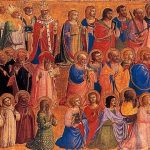The only rare book I have ever owned is a copy of the Aeneid VII–XII, the third of a three-volume set of Virgil’s works, bound in vellum and printed by Abraham Wolfgang in Amsterdam in 1680. Before me in its chain of custody was Zeph Stewart, a classics professor at Harvard and the younger brother of Justice Potter Stewart of the U.S. Supreme Court.
The book did not come to me because Professor Stewart had named me in his will; in fact, he died in 2007, leaving his estate, I presume, to his family. But in January 2019, during my junior year at Harvard, I received an email from the classics department announcing an online auction of his library. This was the first I had heard of him. Figuring, however, that this gentleman was certain to have owned many interesting books, and that they could hardly do worse than to pass into my possession, I spent several hours combing through the catalogue of the auction lots.
The premium lots, of course, quickly outstripped my disposable income, leaving only the more ragtag. At the end of the day I emerged with the electronic title to three of them: a box of Oxford Classical Texts, a set of the classicist Werner Jaeger’s books, and the back end of the Aeneid. I collected all these at a warehouse in northern Massachusetts a few weeks later.
Once returned to my dorm room, I began to examine my winnings. An OCT is a high-quality product, a hardcover copy of an Ancient Greek or Latin text in a critical edition. New, these go for sixty dollars; I had just carried off a box of eighty for four hundred. These comprised most of the standard repertoire, as well as a few less familiar authors (Longinus, Lucian, Asconius, St. Isidore). Stewart had the happy habit of inscribing his books with not only the date but also the place of their acquisition. His copy of the Etymologies of St. Isidore, for instance, reads “Zeph Stewart, Harvard, 1951.” Having ordered the books by their inscriptions, I turned to the internet to look into their prior owner’s life.
He was born January 1, 1921, in Jackson, Michigan, and grew up in Cincinnati, whence he went to Hotchkiss and then to Yale. His father was James Garfield Stewart, the mayor of Cincinnati. The earliest volume in Stewart’s OCT collection is Sophocles’ Fabulae, that is to say, plays, which he won, the bookplate reveals, for an English-composition prize. The inscription reads, “Zeph Stewart, New Haven, 1940.” The remaining volumes give the same location until his graduation in 1942. At that point he joined the army, and the dateline changes to Arlington, Virginia. Harvard hired him in 1953. (Incidentally, the press’s standards suffer a sharp decline in the 1980s, when the paper quality becomes that of elementary-school workbooks. His set of Aulus Gellius’s Noctes Atticae hails from this period.)
Stewart was hardly a conservative. When he was the master of one of the student houses, for instance, he refused to enforce the curfew for women visiting men’s rooms. If the next day he passed a couple emerging into the hallway post delictum, he would say airily, “Good morning, gentlemen,” and stride on. (The Harvard Gazette’s obituary reports more discreetly that he “endeavored to modernize the college rules and regulations.”) Meanwhile, he was known for working until four in the morning and being able to rescue institutions on the brink of financial ruin: thus he saved the failing Loeb Classical Library in the 1970s and the Center for Hellenic Studies in Washington, D.C., in the ’80s.
Old books, especially once their interested owners have died, often contain all kinds of forgotten correspondence, leaflets, scratch paper, and so on. Accordingly, in one of the Jaeger volumes was stashed a letter from the classicist Cyril Bailey of Balliol College, Oxford, dated February 14, 1947, from The Mulberries, East Hanney, Wantage, Berkshire, now Oxfordshire. (In the course of my researches, I came across this tidbit about an earlier occupant of the house: “The Mulberries, East Hanney, was the home of James Robins Holmes, eccentric, philanthropist and a pioneer of birth control. The house was attacked by rioting villagers because of his pro-Boer views during the Boer War.”) When the letter was written, Stewart was still in the army, now stationed in Paris. Bailey addressed himself, in English, to Fr. André-Jean Festugière, O.P., of the Sorbonne, a renowned scholar of Greek religion and Neo-Platonism. “I should like to do anything I could,” wrote Bailey, “to help Lt. Zeph Stewart, and if he is coming to England, I hope he will let me know. I should be delighted to see him here or could meet him in Oxford.”
Stashed in the same book is another letter, Bailey to Stewart, March 21, 1947. Stewart was thinking of doing graduate work on Lucretius, but Bailey warns, “I do not wish to ‘choke you off’ but only to suggest that you are preparing to embark on a very difficult field, in which the pioneer work has already been done.” Still, Bailey informs him that “my edition and commentary will be published this year by the Clarendon Press, Oxford, probably in May or June.” That autumn, Stewart began studying for a classics doctorate at Harvard, and the last stray sheaf of paper is a typewritten syllabus for “Latin 8b: 1947–1948. LVCRETIVS. Required texts: C. Bailey’s Latin text (Oxford Text series).”
One of Stewart’s obituaries records that “he had a lifelong interest in Greek philosophy and religion, particularly the transition to Christianity.” This is evident from his collection of theological works—one of the auction lots that quickly shot out my price range was his Latin opera omnia of St. Augustine. It also throws light on his relationship with his older colleague Werner Jaeger, the German classicist most famous for his three-volume Paideia: The Ideals of Greek Culture. (Of this work Leo Strauss once said, “It would make a fine present for a bar mitzvah.”) Jaeger published another much smaller volume called Early Christianity and Greek Paideia and undertook the first critical edition of the works of St. Gregory of Nyssa. He had been the great Ulrich von Wilamowitz-Moellendorf’s successor in Berlin before moving to Boston.
The lot I bought contained several books by Jaeger, many of them in German, and assorted other theological volumes. Some of these belonged to Jaeger’s Harvard contemporary Arthur Darby Nock. Stewart edited a collection of Nock’s papers called Essays on Religion and the Ancient World. An obituary records Nock’s way of taking notes: “He would tear pieces of paper off undergraduate blue books, scribble notes on them, and put them in a bag behind his desk. Later he would take them out and put them between the pages of books which lay in piles around the room.” His parallel Greek–English copy of the Epistle to Diognetus, which at some point fell to Stewart, is noticeably convex from having been stuffed with these paper scraps.
That leaves the half Aeneid. The volume is quite thick because the critical apparatus takes up most of each page. The poem itself is doled out four or five lines at a time. According to the bookplate, it passed through London in the late nineteenth century, but how Stewart came to it I cannot tell—he departed from his custom of inscription just this once. Nor do I know whether he ever owned the other two volumes, or where those two volumes are. This one I gave to a classics friend as a housewarming present, figuring that his library would be more stable than my own, as a seminarian. Perhaps this was a mistake—some of the great bibliophiles were clerics, especially cardinals. But if one of my friend’s sons makes this Aeneid the germ of a great collection, then my brief period as its owner will be the more fondly remembered.


















